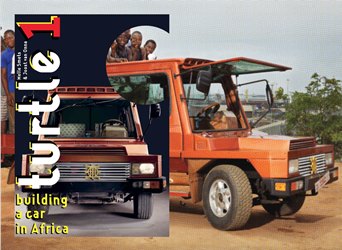Turtle 1: building a car in Africa
 This month’s Library Highlight Turtle 1: building a car in Africa tells the story of the Turtle, a car built entirely from reused or hand-made car parts, in Suame Magazine, an industrial zone in Kumasi, Ghana. This car-building project is at the cutting edge of action research and art. The book is a largely pictorial and partly textual account of the project, from ideation to the Turtle’s inauguration by the king of the Ashanti, its tour through the Netherlands, and its return to its place of birth.
This month’s Library Highlight Turtle 1: building a car in Africa tells the story of the Turtle, a car built entirely from reused or hand-made car parts, in Suame Magazine, an industrial zone in Kumasi, Ghana. This car-building project is at the cutting edge of action research and art. The book is a largely pictorial and partly textual account of the project, from ideation to the Turtle’s inauguration by the king of the Ashanti, its tour through the Netherlands, and its return to its place of birth.
The birthplace of the Turtle, Suame Magazine, is an urban area that is said to be the largest car district in the world and the largest industrial cluster in Sub-Saharan Africa. Estimates indicate that 200,000 people work in the 12,000 car-related shops and workplaces there. It is a place where a lot of used cars from European countries end up, and where they are given a second life.
To the initiators of the project, visual artist Melle Smets and researcher Joost van Onna, Suame Magazine was the ultimate manifestation of the informal economy in which a majority of the global population lives and works. They wanted to find out more about alternative ways of structuring an economy and how people organize their lives without government protection or formal rules.
To this end, they decided to use the method of “action research”, where research is conducted during the course of an action that effects change. Important characteristics of this type of research are the researchers’ personal involvement, active participation and close cooperation with the local population. For Smets and Van Onna, building a car seemed the perfect way to experience and understand the world of Suame Magazine. This book gives an insight into this world, where resourcefulness, self-reliance, improvisation and the ability to self-organise play a vital role.
The ASCL has a special research interest in informal workers and the Suame Magazine area, in particular through the NWO-funded INCLUDE research programme Increasing Political Leverage of Informal and Formal Workers’ Organisations for Inclusive Development: The Cases of Ghana and Benin. For this project fieldwork was conducted in, among other places, Suame Magazine, about which junior researcher Rafael Verbuyst wrote a blog post.
Germa Seuren
More links
- blog on the SMATI TURTLE 1-project
- all ASCL Library titles on the informal sector

